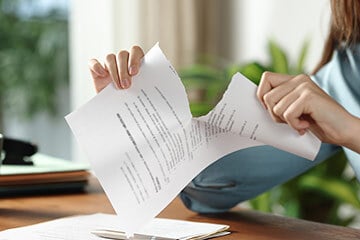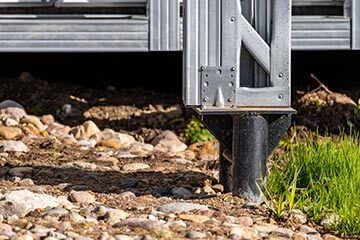There's a lot to think about when moving home, making it one of life's biggest stresses. We're here to go through everything you might need to get ready for the big move.
Still in the process of buying? Check out our step by step guide to buying a house.
Or, if you're ready to move, then read on for tips, tricks and hints to make moving day as seamless as possible.
Good luck!

Declutter what you don't need
Still holding onto that unwanted Christmas gift? It's time to declutter and get rid of anything you don’t need anymore. The more you can get rid of now, the less you have to sort out when you get to your new home.
Plus, decluttering might also reduce your contents insurance costs, as the less you have to insure, the less you may have to pay to insure it.
See exactly how much contents insurance you need, plus what it might cost, with our contents insurance calculator.
What can I do with the things I don't want?
You can take small items to the charity shop. Certain branches take bigger items, such as furniture or electrical goods. You can take anything they don’t want to the local recycling centre.
You can also sell your second-hand items through online marketplaces such as Facebook Marketplace, Gumtree or Vinted. That's extra cash in your wallet that you can use for new decor when you move in. Or a celebratory meal when the move is all done.
Book a removals company
Book your removal company between 6 and 8 weeks prior to your move.
Removal companies can usually be relatively flexible if you need to change the exact moving date later. So don't worry if you haven't got all your ducks in order just yet.
During this time, check the company’s policy on breakages. Most removal companies cover this on their liability insurance. And legally, when your possessions are with them, they have to take reasonable care of it under the law of ‘bailment’.
If you need to look into self storage, it’s also worth doing this about 2 months before the move.
Doing the move yourself?
If you're hiring a van, make sure it's available on the day of your move. If you're using your own van - or car - get an idea of how many trips you'll need to make to move all your stuff. You want to keep the number of trips you need to make to a minimum.
Unlike using a rental company, moving on your own means any breakages are your responsibility.So having contents insurance in place is a good idea.
Many policies come with something called contents away from home cover, which covers your things while they're being transported. This means you may be able to claim for them if they're damaged in transit.
You should be able to get cover away from home for any items worth less than £1,000 each. You can cover up to £12,500 worth of contents with this type if policy.
For any items more expensive than this, think about getting high value items insurance.
Confirm your moving dates
If you’re buying or selling a house you may need to start off with an approximate moving date and plan around that.
If you’re buying a property, then completion day is typically between 7 and 28 days after your solicitor exchanges contracts. This is when you get the keys to your new home.
If you’re renting, give appropriate notice to your landlord
You need to give 4 weeks’ notice to your landlord or letting agent. But this can depend on your rental agreement.
If your move-in date is delayed, give your landlord the new date of when you expect to leave. They might be able to let you stay on a month by month basis.
Make sure you have the right level of home insurance before you move house
Make sure your new house is covered by your home insurance policy from the day you move in. If you want to be extra cautious, you can set the policy to start from the day you exchange contracts.
If you’re moving into a home you’ve just bought, consider a buildings and contents insurance policy.
Contents insurance covers your belongings if they're stolen, lost or damaged. Buildings insurance covers the property itself against damages from a fire, flood or subsidence.
You can also choose home insurance policies that combine both buildings and contents cover.
If you’re moving into a rented home, you might only need a contents insurance policy. Your landlord should have buildings insurance already.
It’s worth comparing home insurance quotes for your new home so you get a good deal. Once you’ve moved out of your old house, don’t forget to cancel the home insurance policy on that property.
“My best tip for moving is to make sure you know your belongings are covered by your home insurance. Moving is stressful enough without having to worry about replacing your smashed TV or broken microwave.
“Check whether your removal company covers the cost of any items they damage under their liability insurance.
“If you’re not using a removal company, or for some reason your removal company doesn’t accept liability, your contents insurance might cover you. That’s if you’ve selected to cover your belongings away from home.
“If you’re moving items in your own car, your car insurance might only cover you for about £150 worth of damage. Again, your contents insurance cover away from home can help replace any items that might get damaged or stolen during your move.”
What our home & lifestyle insurance expert says

Pack everything and label the boxes
Most people choose to do their packing themselves, but you can ask removal firms to do it for you.
The company should normally supply as many flat cardboard boxes as you need along with the packing tape.
Once you’ve sealed the boxes, label them with the room you want them to be in and a brief description of the contents.
Doing this means your removal team can take each box to the right room in your new home on removal day.
Make note of any boxes that are heavy, fragile or contain any high value items.
Although any breakages should be covered by the removals liability insurance, you should still pack your belongings in a way that avoids breakages. For example, plenty of bubble wrap or packing peanuts.
Keep a separate box for any items you think you’ll need for the first few nights.
Keep important documents safe
You should think about keeping documents safe as your move approaches. This includes:
- Birth certificates
- Insurance policy documents
- Contracts
- Pension records
- Passports
Buy a safe box to keep all your important documents and ID safe.
Notify your utility companies
Be sure to notify your gas and electricity supplier of your move. You don’t want to end up paying for someone else’s energy or water usage.
Take a meter readings for water, electricity and gas for both your old and new addresses. You can read more about how to switch suppliers when moving house in our guide.
You also need to switch or get a new contract for your mobile phone, broadband and TV.
Either update your details by calling your provider or look into switching.
Most broadband providers should allow you to move your connection to another property. Some might require you to sign up to a new 12, 18, or 24 month contract.
You could save money by comparing broadband prices – it may also work out cheaper to get a bundle that includes broadband, mobile phone and TV under a single contract.
Notify other organisations
When you move house, you need to notify:
- Your insurance companies
- Council tax and electoral roll
- Royal Mail
- Your bank
- The DVLA for your driving licence and car ownership
- TV licence
- GP and dentist
- Employers, accountants and solicitors
- Subscriptions
Changing the address on your car insurance policy is a top priority as the terms of the policy itself are partly determined by your address.
Where you live and where you keep your car at night are among the factors that are used to calculate your car insurance costs.
You also need to decide whether to change the address on your home insurance, or get a new quote for the new property. If you don’t you could be at risk of invalidating your policy. That means they might not pay out in full if you need to make a claim.
You also have to change the address on the policies of your:
Another priority is updating the address on your driving licence and car registration certificate (V5c) held by the DVLA. You can do this online.
If you don't tell the DVLA when you change address, you could face a fine of up to £1,000. You also put yourself at risk of missing your vehicle tax or any other communications, for example, speeding tickets.
You also need to register for council tax at the new house and deregister with the local authority that covered the old address. Your previous council should generate a bill and send it to your new address if there’s anything left to pay.
If you’re moving into a newly built house, try to notify the new council a few weeks in advance.
You must also make sure that you and all members of your household over 18 are entered onto the electoral roll under the new address.








